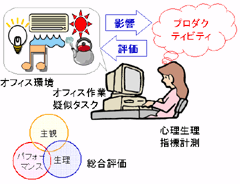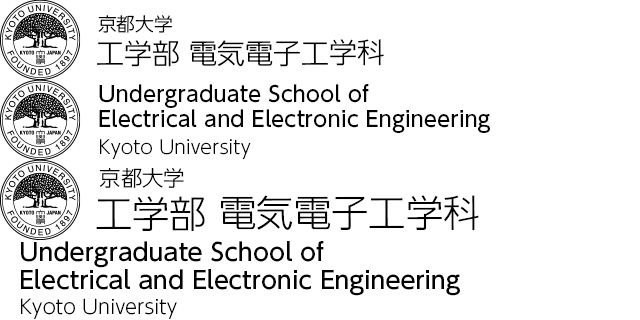Energy and Information
To construct the energy society of the future it is necessary to investigate the question of what system is most suitable from human, social, and environmental perspectives. The Energy Information Science Lab conducts research on human interface systems and the construction of cooperative social systems, aiming at using IT to create a new energy society system.
Academic Staff
Hiroshi SHIMODA
 Professor (Graduate School of Energy Science)
Professor (Graduate School of Energy Science)
Research Interests
- Human Interface
- Human Machine Systems
- Augmented Reality
Contacts
Yoshida Campus Engineering Building No.1 Room 254
TEL: +81-75-753-5609
FAX: +81-75-753-5614
E-mail: shimoda@energy.kyoto-u.ac.jp
Hirotake ISHII
 Assistant Professor (Graduate School of Energy Science)
Assistant Professor (Graduate School of Energy Science)
Research Interests
- Human Interface
- Augmented Reality
Contacts
Yoshida Campus Engineering Building No.1 Room 256
TEL: +81-75-753-5611
FAX: +81-75-753-5614
E-mail: hirotake@ei.energy.kyoto-u.ac.jp
Introduction to R&D Topics
Using IT to develop systems to improve the reliability and efficiency of energy systems
In order to ensure a stable supply of energy it is necessary to not only make advances in power generation plants themselves, but also to develop advanced human-machine interfaces that mediate between people and machines. The work of this lab aims at the development of new energy systems based on the application of augmented reality and various diagnostic models.
Major research themes
- Development of high-precision tracking techniques for augmented reality systems
- Development of augmented reality systems for plant equipment maintenance work
- Abnormality diagnosis in nuclear power plants utilizing multilevel flow models

Proposal of risk communication techniques to promote environmentally harmonious energy utilization
Risk management and risk communication are key challenges in the shaping of cooperative society in the 21st century, for which there is a need for a clear multifaceted risk concept for society, as well as for new techniques for effective risk aversion. This lab conducts research into social acceptance in relation to new forms of energy such as hydrogen energy and to high-level radioactive waste, and makes proposals and evaluations of new techniques for the promotion of reciprocal communication between people of different standpoints.
Major research themes
- Surveys on social acceptance in relation to new forms of energy
- Risk communication in relation to high-level radioactive waste

Proposal of environmental-friendly new lifestyles for an advanced information society of aging population/low birthrate
Although we are progressing towards an ever more advanced information society in the new century, there is, nonetheless, a need for a major social revolution to address the issues of Japan's rapidly aging population/declining birth rate and environmental conservation, in areas such as energy and the environment. This lab is working to develop techniques to measure various kinds of human behavior, and to make proposals and evaluation of new techniques to promote energy-saving behavior, all with the aim of helping to shape new lifestyles that impose a minimal burden on the natural environment.
Major research theme
- Development of diagnostic systems for brain dysfunction utilizing eye-sensing displays
- Research on human productivity measurement and evaluation methods based on measurement of biological indicators
- Development of systems to support energy-saving behavior utilizing affective interfaces

